#countess de courcy
Text
The Signora Neroni, the Countess De Courcy, and Mrs. Proudie Meet Each Other at Ullathorne
http://dlvr.it/Sx4R5H
0 notes
Photo


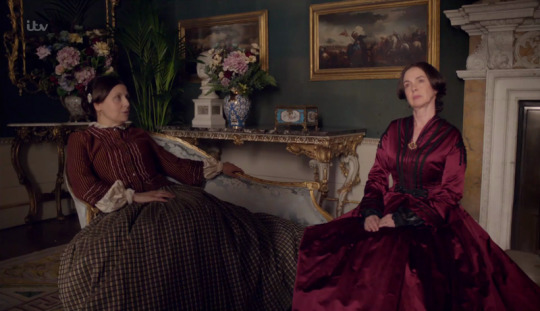
11 notes
·
View notes
Text
first line meme (published fics edition)
Rules: List the first lines of your last 20 published stories. (If you have less than 20, just list them all!) See if there are any patterns. Choose your favourite opening line. Tag some people to play the next round!
Thanks to @your3fundamentaltruths for tagging me!
One Friday afternoon, Kate made the trek from Central London out to Hounslow to visit Mary in time for dinner. (nothing else to say but this)
The Viscount and Viscountess Bridgerton were playing a game in front of Edwina. (and the rest is rust and stardust)
Despite the unorthodox manner in which Charlotte Bridgerton had propositioned the Earl of Clairmont for a dance, Frederick Fitzalan thought the dance itself seemed remarkably staid. (Where I may feel the throbs of your heart or rest upon your hip)
"Very well,” she acquiesced. “Then tell me something wicked." (i touch you (with my mind))
She felt his eyes on her before she saw him. (suddenly a smile, shyly obscene)
Eloise Bridgerton despised being a debutante. (My Heart Revolts)
The annual Bridgerton Pall-Mall Game was well underway. (as certain dark things are to be loved)
One week after moving into an inordinately elegant townhouse in Mayfair, Kate could not help but still marvel at the grand facade of her new home. It had been a twist of fate that landed her family in this home. (Scenes From A Courtship).
It was the orchids that caught Charlotte Bridgerton’s eye. (The Courtship of Charlotte Bridgerton)
There was already someone on the roof when Kate shouldered past the heavy doors on the sixth floor of Grosvenor Prep. (she's not in the attic anymore)
It had been the custom longer than Miles had been alive; Every Friday, Katharine, Viscountess Bridgerton, would refuse all callers except for family, and thus every Friday, Miles and his family dutifully traipsed over to Bridgerton House to pay their respects to the matriarch of their clan, as well as catch up with any and all family members who might be there. (1846)
It was times like Diwali, Kate reflected, that she became very aware of the number of aspiring arsonists within the Bridgerton clan. (A Very Bridgerton Diwali)
The first thing Kate Sharma learned about Anthony Bridgerton upon entering Grosvenor Preparatory School as a freshman was that his mom had to be super, super Catholic. (do not go gentle into that senior year (just rage))
When Charlotte De Courcy, Countess of Clairmont (formerly the Honorable Charlotte Bridgerton) set out to find her little sister Mary on the behest of her mother, she knew she had no intention of returning to the ballroom. (In Which the Bridgerton Siblings Get Drunk)
The air felt heavy tonight, a thick, languid sort of heat that was suffocating every sense. ('Tis not too late to seek a newer world)
Even a year after her wedding, the new Lady Bridgerton found that her gaze fell almost instinctively on her husband, no matter the time or place. (None But You)
The sun has almost completely set on London by the time Siena turns the corner towards her townhouse in Hampstead Heath. (More Than One Path to Happiness)
After he asks her out on a sunny midwinter day, it's as though everyone expects their behavior to shift on a seismic level. (Snippets)
The message comes at night. (Of Blood and Birthright)
Their first invite is to a ball in the London home of the Baron and Baroness de Courcy. (Allied)
Only pattern I can really see is that I like a short, decisive intro sentence that states something fairly obvious lol
My favorite is probably #12 because it's funny and relatable to me and my family.
Anyone who wants to join in, consider yourselves tagged!
#bridgerton#bridgerton fanfiction#kathony#kanthony#charlotte bridgerton#bridgerton next gen#39 clues
49 notes
·
View notes
Photo

During the past few weeks, I felt sometimes that the Suez canal was flowing through my drawing room.
- Clarissa Eden (née Spencer-Churchill), Countess of Avon
Clarissa Eden, born 28 June 1920, is the widow of Anthony Eden, 1st Earl of Avon (1897–1977), who was Prime Minister of the United Kingdom from 1955–1957.
Lady Eden is the daughter of Major Jack Spencer-Churchill (1880–1947), the younger brother of Winston Churchill, by his marriage to Lady Gwendoline ("Goonie") Bertie (1885–1941), a daughter of the 7th Earl of Abingdon, who had been married in 1908. She is thus a niece of Sir Winston Churchill. Her paternal great-grandfather was the 7th Duke of Marlborough, and her maternal great-great-grandfather the 3rd Marquess of Londonderry, half-brother of the 2nd Marquess, who, as Viscount Castlereagh was Foreign Secretary during the Congress of Vienna of 1815 that followed the Napoleonic Wars.
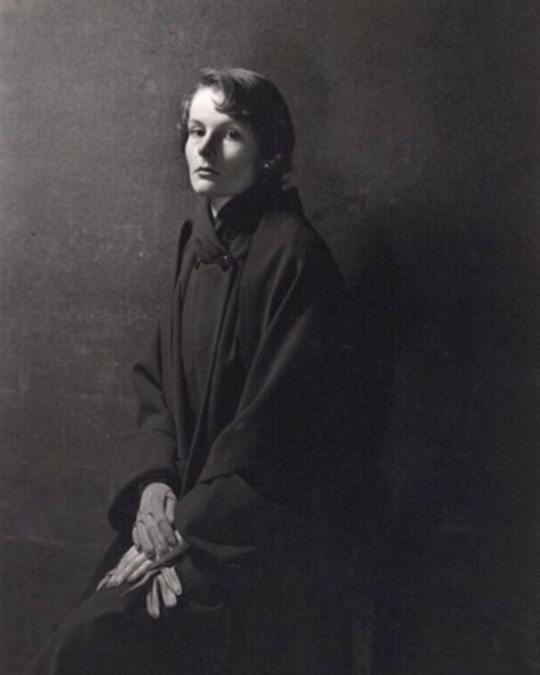
Clarissa Spencer-Churchill was born at her parents' house in the Cromwell Road, Kensington, London. She was educated at Kensington Preparatory School and then at Downham School, Hatfield Heath, a "fashionable boarding school ... orientated to horses". Seventy years later she said she had also felt the need to get away from home—"I just wanted to get out from under the whole thing of being loved too much".
In 1937 Clarissa studied art in Paris. Her mother had asked the British Ambassador, Sir George Clerk, to keep a watchful eye on her, an unintended consequence of this being that she was taken under the wing of an Embassy press secretary who, with his wife, introduced her to a round of café society parties. Among the friends she made in Paris were the monocled Fitzroy Maclean, a future politician and adventurer who was then third secretary at the embassy, and the writer Marthe Bibesco. Together with two female contemporaries, she made a visit to the Folies Bergère, an unusual destination for 16-year-old girls, where the singer Josephine Baker, clad only in a circlet of bananas, became the first naked female body she had ever seen.

In the summer of 1937 Clarissa accompanied Julian Asquith (grandson of the Liberal Prime Minister H. H. Asquith) and his mother, Katherine, on a tour, mainly by third class rail, across the Apennines in the Tuscany region of Italy. Among other artistic treasures, she saw for the first time the 15th century frescos by Piero della Francesca at Arezzo, one of which, "The Queen of Sheba Adoring the Holy Wood" (c.1452), she nominated in 2010 as her favourite painting: "in an age of violence he went on painting clearly and calmly".
When Clarissa returned to London she enrolled at the Slade School of Fine Art. Around this time she displayed her individualism by acquiring a specially tailored trouser suit along the lines of those associated with the actress Marlene Dietrich after the latter's appearance in the film, Morocco (1930).
1938 was the future Lady Avon's "coming out" year and she was regarded as "one of the more notable débutantes" in a "vintage year for beautiful girls", but, having mixed with older and more sophisticated people in Paris, she seems to have disdained the circuit—since described by Anne de Courcy as "more or less naive seventeen- and eighteen-year-olds suddenly flung into a round of gaities"—and was never presented at Court.
Another débutante of 1938, Deborah Mitford, later Duchess of Devonshire, recalled Clarissa Spencer-Churchill as exhibiting "more than a whiff of Garbo in a dress by Maggy Rouff of Paris”.

Among those with whom Clarissa danced at that year's Liberal Ball was the future double agent Donald Maclean, who complained that she was too smart to be "a proper Liberal girl like the Bonham-Carters or the Asquiths". She also knew Guy Burgess, who fled to Russia in 1951 when he and Maclean were about to be unmasked as traitors.
A 2015 biography of Burgess, a homosexual, contained claims that, encouraged by his Soviet "handlers", he had contemplated marriage to Clarissa. However, the latter, then aged 95, denied that they had been close. She described Burgess as "courteous, amusing, nice and good company", but said that he had been "standoffish" towards her and did not wish any friendship to develop.
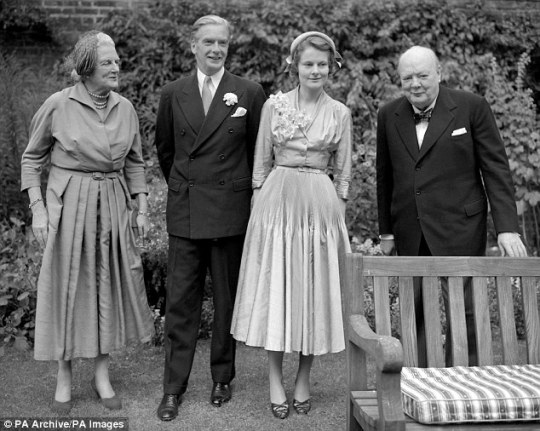
In 1940, encouraged by economist Roy Harrod, Clarissa went to Oxford to study philosophy, although not as an undergraduate because of her lack of qualifications. While there she became associated with, among other leading academics, Isaiah Berlin and Maurice Bowra. Lady Antonia Fraser, whose father, later Lord Longford, was a Fellow of Christ Church, has described her as "the don's delight". For a short while she was tutored by A. J. Ayer, a future Wykeham Professor of Logic known for his libidinous lifestyle, although his womanising was not apparently extended to her.
When Clarissa moved back to London, she decoded ciphers in the Communications Department of the Foreign Office, where her future husband was the Secretary of State from 1940 to 1945.
Clarissa married Anthony Eden in 1952, becoming Lady Eden in 1954 when he was made a Knight of the Garter, and then becoming Countess of Avon in 1961 on her husband's being created an earl.
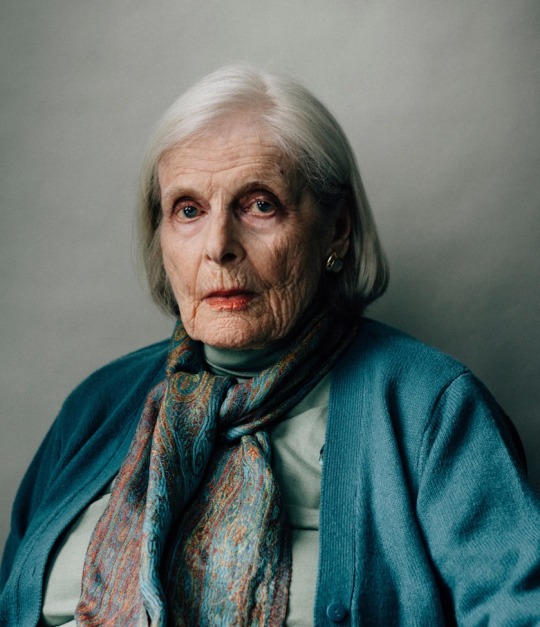
Her memoir, sub-titled From Churchill to Eden, was published in 2007 under the name of Clarissa Eden.
Since the death of Mary Wilson, Baroness Wilson of Rievaulx on 6 June 2018, Lady Avon is the oldest living spouse of a British Prime Minister.
**Portrait by Cecil Beaton
#clarissa#eden#quote#britain#anthony eden#history#world war two#winston churchill#aristocracy#nobility#lady avon#oxford#foreign office#suez crisis
24 notes
·
View notes
Text
"DOCTOR THORNE" (2016) Review
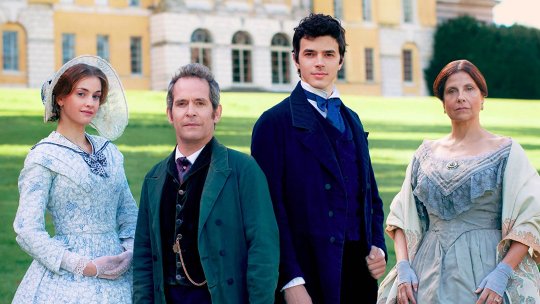
"DOCTOR THORNE" (2016) Review
Two years ago, the ITV aired "DOCTOR THORNE", Julian Fellowes' four-part television adaptation of Anthony Trollope's 1858 novel. As it turned out, the latter was the third novel in Trollope's literary series known as the Chronicles of Barsetshire.
From what I know, the 1858 novel seemed to have little in common to the rest of Trollope's Barstshire series. Dr. Thomas Thorne, the main character in "DOCTOR THORNE", was a distant cousin of Mr Wilfred Thorne, a minor character in "Barchester Towers". Aside from that, the rest of the characters in "DOCTOR THORNE" seemed to have very little or no connections to the remaining Barstshire series.
The plot for "DOCTOR THORNE" seemed pretty straightforward. Our main protagonist is a respected doctor who has been raising his niece, Mary Thorne, on his own. Years earlier, Doctor Thorne's ne'er-do-well older brother Henry had seduced one Mary Scatcherd. When her stonemason brother Roger Scatcherd had learned about his sister's pregnancy, he engaged in a fight with Henry and killed him. Scatcherd ended in prison for several years, his sister gave birth to a daughter before moving to Australia with a new husband, and Doctor Thorne ended up raising his niece and keeping her parents' identities a secret.
Following his release from prison, Roger Scatcherd becomes wealthy as railway project undertaker, got married, became a father and acquired a baronet. He also becomes a chronic alcoholic. Thorne becomes the family doctor to the Greshams, a local family of the landed gentry. He he persuades Scatcherd to lend money Mr. Francis Greshams, the local squire, who has troubles managing his finances. Within time, much of the Gresham estate is put up as collateral. Meanwhile, Mary forms a close friendship with the Gresham children and falls in love with Frank Gresham, Squire Gresham's only son and heir of the squire, and he with her. But due to the family's finances, Squire Gresham's wife, Lady Arabella, plots to end Mary and Frank's romance and find a wealthy wife for her son. However, Sir Roger's only son and heir, Louis Scatcherd, also falls in love with Mary. And like his father, Louis has also acquired a drinking habit. Dr. Thorne is forced to struggle to help his niece find happiness, while at the same time, deal with Lady Arabella's scheming for her son, and the tenuous financial situation between the Scatcherds and the Greshams.
"DOCTOR THORNE" received mixed reviews when it aired on both British and American television. I suspect that many critics believed that the production seemed to lack the bite of previous Trollope adaptations. And if I must be honest, I agree with them. Overall, "DOCTOR THORNE" struck me as a fluff piece into the life of Victorian society, despite the social snobbery portrayed in the miniseries, along with the fact that two of the characters were alcoholics. I believe it had something to do with the production's tone. Thanks to Julian Fellowes' writing, the miniseries felt more like a light comedy with flashes of melodrama. Especially for a story that featured social bigotry, family secrets and alcoholism.
It did not help that the only characters in this story who truly suffered in the end were the members of the Scatcherd family. Personally, I wish that Lady Arabella Gresham had suffered a lot more than a slight embarrassment over the discovery of Mary Thorne's newly inherited wealth by the end of the story. I found the aristocratic matriarch's efforts to break up Frank Jr.'s romance with Mary a lot more perfidious than the Scatcherds' financial hold over the Greshams or even the malice and hostility that Sir Roger's son Louis had harbored toward the high-born family. After all, the Greshams had found themselves in financial difficulties, thanks to Squire Gresham's mishandling of the family's income and the family's spending habits.
But despite my qualms over the production, I still managed to enjoy it. "DOCTOR THORNE" proved to be a humorous and romantic story about Mary Thorne's relationship with Frank Gresham Jr. and the obstacles - both socially and emotionally - they were forced to overcome. I also enjoyed the humorous subplot involving the political going-ons in Barsetshire and the upcoming election between Sir Roger Scatcherd and Mr. Moffat, another self-made man who had managed to gain support from the Gresham family. The miniseries also proved to be a poignant family drama involving the Thorne and Scatcherd families, with a big emotional payoff. And all of this romance and family drama was witnessed by the always dependable Doctor Thorne, who seemed to serve as the story's backbone.
The production values for "DOCTOR THORNE" proved to be top-notch. Production designer Kristian Milsted did a solid job in re-creating Barsetshire, the fictional mid-19th century community (for its middle-class and upper-class citizens) featured in this story. Her efforts were ably assisted by Caroline Story's art direction and Jan Jonaeus's sharp and colorful photography, which did justice to various locations utilized in various counties in Southern England. I especially enjoyed the costumes created by Colleen Kelsall as shown below:

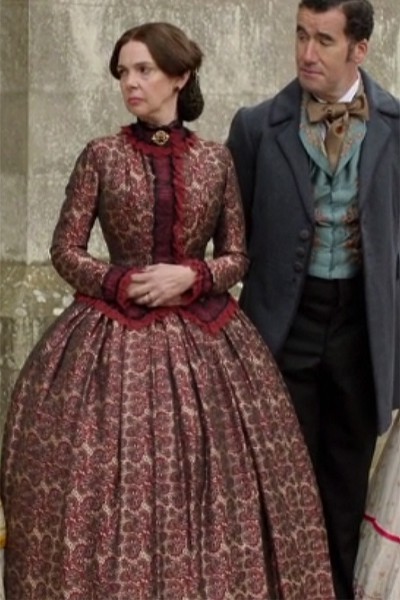
However, I felt a bit disturbed when I noticed that the day dresses worn by some of the women characters exposed a bit of cleavage:
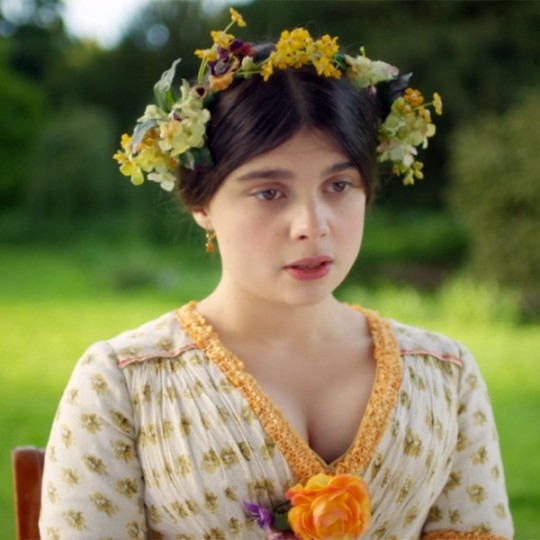
Unless I happened to be wrong, 19th century women did not reveal any cleavage during the daytime. It was considered appropriate to do so in the evening for formal dinners and parties. I also noticed in the image above that actress Gwyneth Keyworth is also wearing a flower crown. A flower crown with daytime casual wear? I do not think so. Flower crowns - popularized by Queen Victoria during her wedding to Prince Albert - were usually worn by brides and bridemaids during wedding ceremonies, formal dinners and parties. I have one last complaint. The mid 19th century hairstyles worn by the women cast members seemed spot on to me . . . with one exception:
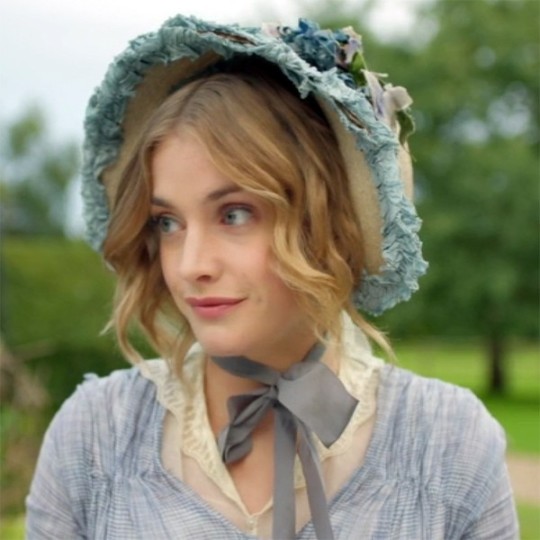
What on earth was the production's hairstylist thinking by allowing this modern touch to actress Stefanie Martini's hairstyle? Or was the hairstylist trying to copy the following look?
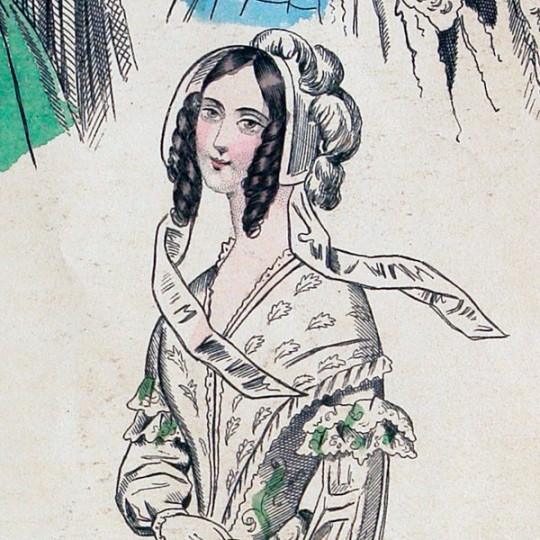
The problem is that the above style was prevalent in the 1840s, a decade before the setting for "DOCTOR THORNE". And Ms. Martini's "curls" are a tad too short.
The miniseries featured a mixture of solid and excellent acting. I can honestly say that there was not a bad performance in the production. Performers such as Nicholas Rowe, Alex Price, Cressida Bones, Janine Duvitski, Danny Kirrane, Tim McMullan, Nell Barlow all provided solid performances. More solid performances came from Edward Franklin, who seemed a tad over-the-top as the hostile and alcoholic Sir Louis Scatcherd; Harry Richardson, whose portrayal of Frank Gresham Jr. struck me as a bit bland; and Stefanie Martini's performance as Mary Thorne struck me as charming, but not quite interesting. The real problem proved to be the character, who seemed to lack any interesting personality traits.
One of the more interesting performances came from Rebecca Front, who did an excellent job in conveying Lady Arabella Gresham's snobbish and ruthless nature. Phoebe Nicholls' Countess de Courcy (Lady Arabella's sister-in-law) proved to be equally snobbish and ruthless. However, Nicholls skillfully conveyed how Lady de Courcy's ruthlessness proved to be more subtle. Richard McCabe did an excellent job of portraying Francis Gresham's likable, yet slightly weak nature. Gwyneth Keyworth gave an excellent performance as Frank Jr.'s complex and slightly mercenary sister, Augusta Gresham. Kate O'Flynn gave a skillful performance as Augusta's equally mercenary cousin, Lady Alexandrina de Courcy, who proved to be a lot more manipulative. Alison Brie gave a very charming, yet sly performance as the wealthy American heiress Miss Dunstable, who proved to be a very sensible and wise woman. One of two best performances in the miniseries came from Ian McShane, who gave a superb performance as the alcoholic, yet proud and loyal Sir Roger Scatcherd. The other best performance came from Tom Hollander, who did a superb job as the leading character, Doctor Thomas Thorne, a sensible and put upon man, who constantly struggles to look after his niece from the likes of Lady Arabella and keep Squire Gresham from folding under the weight of debts.
What else can I say about "DOCTOR THORNE"? It is not one of the best television productions I have seen. It is probably the least impressive Anthony Trollope I have ever come across. But despite its flaws, I rather enjoyed it. I found it rather charming and likable, thanks to Julian Fellowes' screenplay and the excellent cast led by Tom Hollander.
#anthony trollope#doctor thorne#doctor thorne 2016#julian fellowes#victorian age#literary#tom hollander#stefanie martini#harry richardson#ian mcshane#rebecca front#gwyneth keyworth#richard mccabe#edward franklin#alison brie#kate o'flynn#period drama#costume drama#itv doctor thorne
8 notes
·
View notes
Text
Doctor Thorne (version 2) by TROLLOPE, Anthony
This is the third book in The Chronicles of Barsetshire, the first two being The Warden and Barchester Towers; however, although some characters from the first two books are referred to, there is no need to read/ listen to them first to enjoy Dr. Thorne.
It is mainly concerned with the romantic problems of Mary Thorne, niece of Doctor Thomas Thorne (a member of a junior branch of the family of Mr. Wilfred Thorne, who appeared in Barchester Towers), and Frank Gresham, the only son of the local squire, although Trollope as the omniscient narrator assures the reader at the beginning that the hero is really the doctor.
Themes of the book are the social pain and exclusion caused by illegitimacy, the nefarious effects of the demon drink and the difficulties of romantic attachments outside one's social class. The novel also gives a vivid picture of electioneering and all the barely legal shenanigans that accompany the event. Most of the action takes place in a village of Barsetshire and a country house not far off.When their father dies, Doctor Thomas Thorne and his younger, ne'er-do-well brother Henry are left to fend for themselves. Doctor Thorne begins to establish a medical practice, while Henry seduces Mary Scatcherd, the sister of stonemason Roger Scatcherd. When Scatcherd finds out that Mary has become pregnant, he seeks out Henry and kills him in a fight.
While her brother is in prison, Mary gives birth to a girl. A former suitor offers to marry her and emigrate to the United States to start a new life but refuses to take the baby. Doctor Thorne persuades her to accept the generous offer, promising to raise his niece. He names her Mary Thorne but wishing neither to have her illegitimacy made public nor to have her associate with the uncouth Roger Scatcherd, he keeps her birth secret. He tells Scatcherd that the baby had died.
After his release, Scatcherd rises quickly in the world as a railway project undertaker. In time, his skills make him extremely rich. When he completes a seemingly-impossible important project on time, he is made a baronet for his efforts. Throughout his career, he entrusts his financial affairs to Doctor Thorne. When Thorne becomes the family doctor to the Greshams, he persuades Scatcherd to lend ever growing sums to the head of the family, the local squire, who has troubles managing his finances. Eventually, much of the Gresham estate is put up as collateral.
Meanwhile, Mary grows up with the Gresham children and becomes a great favourite with the whole family. As a result, Thorne feels obliged to tell his friend the squire the secret concerning her birth.
Mary falls in love with Frank Gresham, the only son and heir of the squire of Greshamsbury and nephew of the Earl and Countess de Courcy, and he with her. His parents desperately need him to marry wealth, to rescue them from the financial distress resulting from the squire's expensive and fruitless campaigns for a seat in Parliament. As Mary is penniless and of low birth, such a marriage is frowned upon by his mother Lady Arabella and the de Courcys.
His snobbish mother and maternal aunt bearing the aristocratic de Courcy family name wish him to marry a thirty-year-old eccentric but intelligent and kind-hearted, heiress, Martha Dunstable. He reluctantly visits Courcy Castle and they become friends. He foolishly and playfully proposes. She demurs, knowing that he does not love her and he tells her about his love for Mary.
Sir Roger is a chronic drunkard and Doctor Thorne tries in vain to get him to curtail his drinking. In his will, he stipulates that the bulk of his estate go to his odious, dissolute only son Louis Philippe but he leaves Doctor Thorne in control of the inheritance until the heir reaches the age of twenty-five. Should Louis die before then, Scatcherd stipulates that the estate go to his sister Mary's eldest child. Thorne is forced to divulge Mary's history but Scatcherd leaves the will unchanged.... - Summary by Wikipedia
from Libricox http://bit.ly/2vIM9UX
via IFTTT
1 note
·
View note
Quote
The countess, the Lady Arabella, and Miss Gresham had been talking over Greshamsbury affairs, and they had latterly been assisted by the Lady Amelia, than whom no de Courcy ever born was more wise, more solemn, more prudent, or more proud. The ponderosity of her qualifications for nobility was sometimes too much even for her mother, and her devotion to the peerage was such, that she would certainly have declined a seat in heaven if offered to her without the promise that it should be in the upper house.
Anthony Trollope, Doctor Thorne
#quote#quotation#Anthony Trollope#Barsetshire Chronicles#aristocracy#wise#solemn#prudence#proud#ponderosity#nobility#devotion#peerage#heaven#House of Lords
1 note
·
View note
Photo
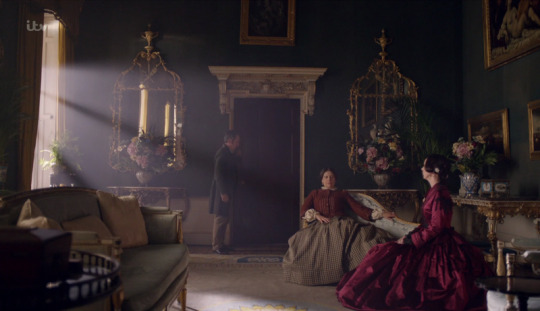
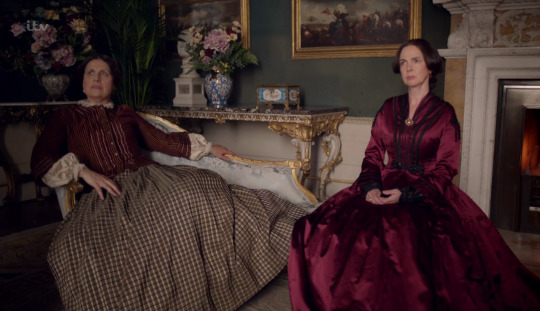

6 notes
·
View notes
Photo



4 notes
·
View notes
Photo



3 notes
·
View notes
Photo



2 notes
·
View notes
Photo



2 notes
·
View notes
Photo



2 notes
·
View notes
Photo



1 note
·
View note
Photo



1 note
·
View note
Photo



4 notes
·
View notes